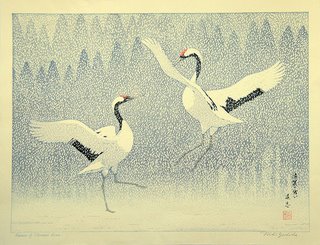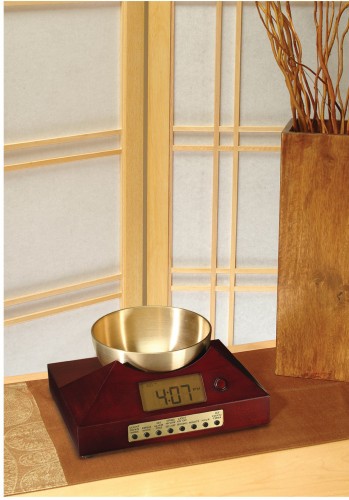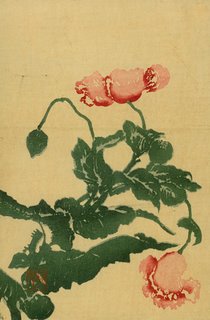|
 Secure Site
Secure Site
|
 |
Archive for the 'Japanese Inspired Zen Clocks' Category
 tranquillity In Buddhism, passaddhi refers to tranquility of the body, speech, thoughts and consciousness on the path to enlightenment. As part of cultivated mental factors, passaddhi is preceded by joy (pīti) and precedes concentration (samādhi).
adapted from wikipedia.org
 Digital Zen Timers, a mindfulness practice tool
Posted in Japanese Inspired Zen Clocks, Now & Zen Alarm Clocks, Progressive Awakening, Yoga Timer
 watsu
Watsu, a portmanteau of water and shiatsu, is a form of body massage performed while lying in warm water (around 35 °C or 95 °F). The receiver of Watsu treatment is continuously supported by the therapist while he or she rocks and gently stretches the body. Because it is performed in the water, the body is free to be manipulated and stretched in ways impossible while on the land. A normal session would a professional hour of 50 minutes. Many Watsu practitioners us the Zen Timer to end their sessions.
 Bamboo Digital Chime Clock, a Watsu Timer and Clock Watsu was created by therapist Harold Dull in the early 1980s, then director of the Harbin School of Shiatsu and Massage in northern California. The technique slowly evolved as he began to incorporate aspects of Zen Shiatsu into his therapy. Watsu pools have now been introduced as a therapeutic passive massage tool as in the 2008 Turkish hamams Lake Conroe resort project.
adapted from wikipedia.org
 watsu Now & Zen
1638 Pearl Street
Boulder, CO 80302
(800) 779-6383
Posted in Bamboo Chime Clocks, Chime Alarm Clocks, Hot Springs, Japanese Inspired Zen Clocks, mindfulness practice, Well-being
 zen appreciation If you have been browsing on-line you may have seen a Google Ad-words for the search term “Buddhist alarm clock” that leads to our website www.Now-Zen.com.
“Buddhist Alarm Clock” is not a product name or search term we created, but instead one that people have been using on their own. We are the makers of the world famous “Zen Alarm Clock” and although we are using the word “Zen” as part of our trademark, we are not trying to associate directly with Buddhism or any other organized religion. We have no control over “Buddhist Alarm Clock” being used by Google.
The founders of our company have great respect for the spiritual teachings and the aesthetic achievements of Buddhism, but we also respect and appreciate a wide variety of other spiritual paths as well. Zen is the name of an ancient form of Japanese Buddhism, but ever since Robert Pirsig’s famous book, Zen And The Art of Motorcycle Maintenance, was published in 1974, the word “Zen” has come to have a larger meaning within American popular culture. Zen also connotes a sort of nondenominational metaphysical quality that transcends any particular spiritual forms or teachings. The word evokes the image of a beautiful rock garden or a weather beaten pine tree on a windswept mountainside.
The timeless aesthetics of Zen Buddhism did provide inspiration for our Zen Alarm Clock, but the design also arose from other influences, such as the sublime patterns of sacred geometry. We thus use the word “Zen” in the name of our product as a kind of lighthearted tribute to progressive spiritual culture. But, as we have been careful to explain over the 15 years we have been in business, we make products for both spiritual and non-spiritual people and we are not directly associated with Buddhism or any other specific form of spirituality.
Our motto is “quality of thought, stillness of being” and we hope that this is the kind of spiritual message that everyone can appreciate.
We apologize any confusion that the Ad-words search term “Buddhist Alarm Clock” may have caused. If you continue to have any questions at all, please contact us or visit www.now-zen.com for more information.
Posted in Chime Alarm Clocks, Japanese Inspired Zen Clocks, Natural Awakening, Now & Zen Alarm Clocks, Progressive Awakening, zen
 mindful walking When you apply a few simple techniques, you can turn your daily walk into a rewarding practice.
What is mindful walking? It’s a technique that uses awareness of the mind/body connection to improve the quality of your walking experience on all levels. By approaching a walk in a mindful way, you make it a practice like yoga, meditation, or tai chi; every session brings new insights and challenges. As in yoga, you think about your body position, breathing, movements, and awareness, turning inward and outward at the same time. You’re working to get fit, and to improve your life as a whole. Treat walking as a practice, and it will become not only something you do with your legs but also a way to bring your mind, body, and spirit into balance.
Five Steps to Make Walking a Mindful Practice
Identify your intention. The key to any mindful activity, intention provides focus and motivation, elevating your practice from routine to ritual. What is your intention? To walk for an hour every day? To develop a sense of centeredness and calm? To reduce stress? Your goals and intentions will evolve as you evolve. Let them, as long as they keep you in line with your higher sense of purpose — and keep you moving forward.
Be consistent. A true practice requires ongoing attention. Of course, it’s natural to feel resistant at times, no matter what kind of activity you do. Your mind will create a thousand excuses not to walk today. Don’t let these passing thoughts distract you from your deeper intention. Get moving; start walking around your office or home, or wherever you are. You can quiet the mind by moving your body and get yourself back on track.
 train your mind to focus Train your mind to focus. The mind loves — and craves — engagement. Without something to focus on, it will tend to wander, taking your practice with it. By learning to focus, you will be able to walk more efficiently.
Listen to your body. As with any relationship, the connection between mind and body depends on how well one listens to the other. Our tendency is to try to rule the body with the brain; however, they are more like equal partners, offering feedback and direction as you go. Listen to what your body is trying to tell you by noticing any sensations that come up while you’re walking. You may feel energized as your leg muscles engage or relaxed as your breathing deepens. If you detect any complaint from your body, such as pain or discomfort, identify the source. Then make small adjustments in your technique and see whether the sensation lessens.
Embrace the process. Goals provide a greater context for your practice. But building patient awareness of the process is even more important. Sometimes walking will feel easy and rewarding; other times, more like a chore. As part of a mindful practice, you accept the challenge as part of the process and continue to stick with it. My tai chi master sees difficulty as an opportunity — a lesson to be learned. Accepting all of these parts of the process lies at the heart of making walking a mindful exercise.
adapted from Body + Soul Magazine, April/May 2006
 Meditation Timer, The Digital Zen Alarm Clock in Solid Walnut Now & Zen
1638 Pearl Street
Boulder, CO 80302
(800) 779-6383
Posted in Japanese Inspired Zen Clocks, mindfulness practice, Now & Zen Alarm Clocks, Uncategorized, Well-being, Zen Timers
 zen-like garden, a perfect meditation space to use your Zen Meditation Timer A couple of years ago, I heard Diane Ackerman, who writes beautifully about gardens and gardening, discussing her passion on National Public Radio. She and the host agreed that our gardens reflect ourselves, our way of looking at life. I thought about my own garden, and I liked the idea. My lavender was just plumping with sweet-smelling buds, the vinca was fresh and green with perky purple flowers, and the peonies held promise in their tight little fists.
That was in June. By August, the thought of my wild, out-of-control garden reflecting anything about me was slightly horrifying. The lemon balm had run amok; the peony bush—never caged—was limp and trampled. In my backyard, a virulent type of Japanese knotweed had grown into a jungle. As it does every year, nature had taken its course in my yard, and I hadn’t managed to keep it in check. Oh, the temptation to just call it wabi-sabi and leave it at that. It was, after all, very natural in its untidy way.
But I know better. Wabi-sabi is tamed, subdued, and serene. I know that the natural gardens I inevitably fall for—which feel almost untouched by human hands—actually owe their serenity and peace to hours of hard labor. There’s a fine art to creating a garden that feels close to nature but also offers carefully thought-out spots for meditation and reflection, just the right combination of color and blooms throughout the season, and enough structure and muscle to provide interest even in December. One where I can use my Zen Timepiece to each day to do my mindfulness practice. A truly wabi-sabi garden is a creative endeavor of the highest sort. (And some day—when my kids are older and my work life slows down—I vow I’ll accomplish that.)
 Zen Timepiece with brass singing bowl, a meditation timer I’m slowly working toward my wabi-sabi paradise by putting in plants that are native to my place: slightly weedy black-eyed Susans and columbine, wild rosebushes dug up from my neighbor’s yard, heat-loving yarrow. I’ve welcomed intruders, if they have something to offer and don’t get too pushy. The chokecherry that made its way down from the foothills near my house provides long, delicate white blossoms in springtime and brilliant red-orange leaves in the fall (great branches to bring inside). The mullein that planted itself in my flower garden is tough and phallic, but the bloom of tiny yellow flowers around its stalk in late summer expresses its feminine side.
These indigenous species, adapted to my brutal high-desert climate, can take care of themselves and manage to look good—even in August—without a lot of care and attention. The creative part, for me, is mapping out where they’ll thrive and how they’ll interact with each other and with the humans who visit. And this is where the wabi-sabi spirit really comes in. The wabi-sabi garden embraces and enhances the delicate balance between nature and nurture. It’s not formal and prissy like an English garden—but it’s not overrun with lemon balm and knotweed. Plants are chosen because they belong in that garden, in that climate. They’re allowed to strut their stuff, but they’re expected to be considerate of the plants around them—or be tamed. Brash, blowsy blooms, which generally require a high degree of maintenance, are used sparingly, if at all.
Just as important as what plants are chosen and where they’re placed are the garden’s bones: the stones and pebbles used to create winding paths and delineations, the rusty iron gate beckoning entrance, the trellis teasing vines up its length. In this aspect, gardens offer all sorts of wabi-sabi opportunity. Place an old, broken-down chair in the flowerbeds; let the weather work its magic and the plants grow up around it until it seems rooted and organic to that place. Plant gourds in an old wheelbarrow and let them spill languidly over the sides. Build a stone wall; the very act of placing stone upon stone is a satisfying meditation. Create paths that encourage guests to meander, with stopping points where the vista is ideal.
With the right structure in place, the wabi-sabi garden is as beautiful—if not more so—in December as it is in June. The sculptural bare branches, brittle seedpods, and somber palette of the winter garden are as wabi-sabi as it gets. Stark and naked, the plants stand as vivid symbols of nature’s way: birth, death, rebirth. The blossoms of life are easy to admire; the quiet integrity of plants gathering energy for rebirth takes a deeper appreciation. A stroll through the garden in the dead of winter is a fine place to cultivate that depth.
Adapted from Natural Home Magazine, March/April 2005 Reprinted with permission from The Wabi-Sabi House: The Japanese Art of Imperfect Beauty by Robyn Griggs Lawrence (Clarkson Potter, 2004).
Posted in Bamboo Chime Clocks, Chime Alarm Clocks, Japanese Inspired Zen Clocks, Now & Zen Alarm Clocks, wabi-sabi
 Sleep sounder with pure essential oils Studies indicate that certain aromas may promote sounder sleep, enhance dreaming, and improve awareness and receptivity the following day. EEG (electroencelphalogram) tests at the Smell & Taste Treatment and Research Center in Chicago indicate that lavender increases alpha wave activity in the posterior portion of the brain and helps induce sleep. “Alpha wave activity increases when you are relaxed,” says Alana Hirsch, M.D., medical director at the Center. “Put a few drops of lavender pure essential oils on your pillowcase before going to bed,” Hirsch recommends. Studies also show that vanilla helps people fall asleep quicker and promotes faster movement into the REM or dream state, he adds. In addition, research at the Society of Psychophysiological Research found that sleepers in jasmine-scented rooms enjoyed better quality sleep and morning-after alertness than those that slept in a non-scented room. To start sleeping sounder, purchase organic vanilla essential oil at your local natural food store or online at http://homespaorganics.com; pure essential oils of lavender and jasmine are also available at natural food stores and at www.aveda.com. Sweet dreams… adapted from Healing Lifestyles & Spas, Kyle Roderick, Sept./Oct. 2005
 Bamboo Zen Alarm Clock with Chime Now & Zen
1638 Pearl Street
Boulder, CO 80302
(800) 779-6383
Posted in Bamboo Chime Clocks, Chime Alarm Clocks, Japanese Inspired Zen Clocks, Natural Awakening, Now & Zen Alarm Clocks, Sleep Habits, Well-being
 Irises by Ogata Korin Edo 1700s, Tokyo
Ogata Kōrin (1658 – 1716) was a Japanese painter and lacquerer.
 Zen Chime Alarm Clock, Digital Black Lacquer Chime Clock Now & Zen
1638 Pearl Street
Boulder, CO 80302
Posted in Bamboo Chime Clocks, Chime Alarm Clocks, Japanese Inspired Zen Clocks, Meditation Tools, mindfulness practice, Now & Zen Alarm Clocks, Progressive Awakening, Zen Timers
 Sousaku Hanga woodblock print by Yoshida Toshi, ca. 1970 Compassionate Listening Practice by Thich Nhat Hanh
When we speak of listening with compassion, we usually think of listening to someone else. But we must also listen to the wounded child inside of us. The wounded child in us is here in the present moment. And we can heal him or her right now.
Practice: “My dear little wounded child, I’m here for you, ready to listen to you. Please tell me all your suffering, all your pain. I am here, really listening.” If you know how to go back to her, to him, and listen like that every day for five or 10 minutes, healing will take place. … Do that for a few weeks or a few months, the wounded child in you will be healed. Mindfulness is the energy that can help us do this. The Tibetan Bowl Timer will gently bring your practice to an end after 10 minutes.
—Thich Nhat Hanh, from Anger: Wisdom to Cool the Flames
 Zen Alarm Clock for a Gentle Awakening with a Bowl Gong and Mindfulness Timer Now & Zen
1638 Pearl Street
Boulder, CO 80302
Posted in Chime Alarm Clocks, Japanese Inspired Zen Clocks, Meditation Tools, mindfulness practice, Natural Awakening, Progressive Awakening, Yoga Timer, Zen Timepiece by Now & Zen, Zen Timers
 Kiyonaga Torii, Beauties Listening to Bonsai Vendor Ukiyo-e Woodblock Print How can we save the world from growing intolerance, how can we stop the spiral of violence? ‘ Silence is often the best answer,’ says the Dalai Lama. More and more experts are admitting he is right. This is not the time for analyses, reports and threats. We now need to stop and take the time to really listen to one another. Of course, listening is not always easy, but a growing number of initiatives are aiming to help people master this difficult art. The International Listening Association declared March to be International Awareness Month.
As part of their campaign they gave tips on how to listen. ‘Count to three when the person you are speaking with has finished talking. That person will often take this to be a signal to go on talking. You will be surprised at how much extra information you get. If you are interrupted, do not get irritated, do not attack and do not lecture, but simply say: “Please listen for a moment, I am not finished yet.”
The American psychologist Michael Kahn wrote a book that includes the topic of listening: The Tao of Conversation (Rainbow Pockets, 1998). He describes people entering a conversation with the intention of winning, people that only feel better if the other person feels worse. ‘We so badly want to be heard and confirmed that we think it is worth having an argument. ‘ The listener is the one who is catching his breath after having presented his view.
 Peonies, c. 1900 unknown Kahn explains what a relief it was when he discovered a conversation does not have to be a contest. Like the Tao, it can flow calmly and peacefully and still be very powerful. Kahn’s tip: ‘Engage in a conversation as if you were making love to someone. Your good mood depends on how good the other feels. Or is your idea of a conversation a jam session, where musicians listen to each other and are inspired by each other? Ask yourself: Do I want to learn or do I want to win?’
Listening, true listening, heals. This was beautifully described years ago in Michael Ende’s classic Momo and the time savers. Because she is the only one in a hurried world who has time to really listen, the little vagabond girl Momo steals the hearts of all. Even children – taking after their parents – have less and less time for stories and games. In the end, Momo saves the city from the gloomy oppression of the grey men who are stealing everybody’s time. Listening as the solution to the world’s problems seems so simple, but in practice turns out to an enormous challenge. It is time we learned that history only repeats itself because nobody was listening the first time.
One of the ultimate Zen like experiences is waking-up from a great slumber refreshed and energized. Your mind and body are harmoniously one, both alert and focused. Having a refreshed mind and body are two keys to a natural and Zen lifestyle. Waking up in the morning should not be a loud and abrupt awakening, but rather it should be a peaceful positive experience. The right natural alarm clock can transition your deep and tranquil sleep into a serene start to consciousness. Imagine a long-resonating Tibetan bell-like chime waking you up to a beautiful morning experience.
The right alarm clock can be the most beneficial investment for you. With our Now & Zen natural alarm clock you are awakened more gradually and thus more naturally. Now & Zen is focused on creating a naturalistic lifestyle, and our clocks are an example of our philosophy.
 Bamboo Digital Chime Clock, a calming timer and alarm clock made from natural materials like bamboo, walnut, and maple adapted from Ode Magazine, April 2003 by Tijn Touber
Now & Zen’s Soothing Alarm Clock Store
1638 Pearl Street
Boulder, CO 80302
(800) 779-6383
Posted in Bamboo Chime Clocks, Chime Alarm Clocks, Goodness, Japanese Inspired Zen Clocks, Meditation Timers, Meditation Tools, mindfulness practice, Natural Awakening, Progressive Awakening, Truth, Well-being
 the beauty of imperfection Wabi and sabi refers to a mindful approach to everyday life. Over time their meanings overlapped and converged until they are unified into Wabi-sabi, the aesthetic defined as the beauty of things “imperfect, impermanent, and incomplete”.
Things in bud, or things in decay, as it were, are more evocative of wabi-sabi than things in full bloom because they suggest the transience of things. As things come and go, they show signs of their coming or going and these signs are considered to be beautiful.
In this, beauty is an altered state of consciousness and can be seen in the mundane and simple. The signatures of nature can be so subtle that it takes a quiet mind and a cultivated eye to discern them. In Zen philosophy there are seven aesthetic principles for achieving Wabi-Sabi.
Fukinsei: asymmetry, irregularity
Kanso: simplicity
Koko: basic, weathered
Shizen: without pretense, natural
Yugen: subtly profound grace, not obvious
Datsuzoku: unbounded by convention, free
Seijaku: tranquility
Each of these things are found in nature but can suggest virtues of human character and appropriateness of behaviour. This, in turn suggests that virtue and civility can be instilled through an appreciation of, and practice in, the arts. Hence, aesthetic ideals have an ethical connotation and pervades much of the Japanese culture.
adapted from wikipedia.org
 Zen Alarm Clock, Ukiyo-e Hokusai Wave Dial Face Now & Zen Headquarter Store
1638 Pearl Street
Boulder, CO 80302
(800) 779-6383
Posted in Bamboo Chime Clocks, Chime Alarm Clocks, Hokusai Wave, Japanese Inspired Zen Clocks, mindfulness practice, Natural Awakening, Now & Zen Alarm Clocks, Progressive Awakening, wabi-sabi
« Previous Entries
Next Page »
|
|
|
|